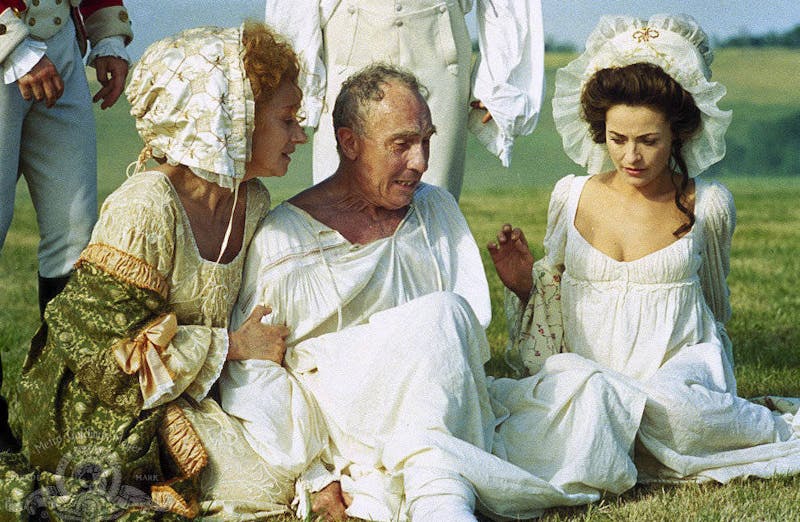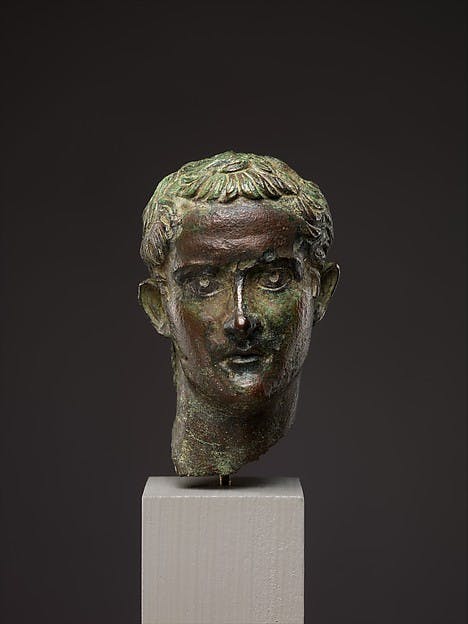In the fourth chapter of the Book of Daniel, the Babylonian king Nebuchadnezzar recounts a dream of a “tree of great height in the midst of the earth.” The tree is so vast that it stretches all the way up to heaven. It is full of fruit.
Beneath it the beasts of the field found shade
And the birds of the sky dwelt on its branches;
All creatures fed on it.
But then a “holy Watcher”—an angelic messenger of God, the “Most High”—tells the dreaming king to strip the branches and chop down the tree, leaving only its stump, scattering its fruit and all the beasts that dwell in its shade, after which the king himself will be
drenched with the dew of heaven,
And share earth’s verdure with the beasts.
Let his mind be altered from that of a man,
And let him be given the mind of a beast[.]
What, the king asks Daniel, does it all mean?
Well, Daniel tells him, it means you’re going to go nuts for seven years and think that you’re a cow. Which is precisely what happens.
Donald Trump has not yet gone out to graze on the South Lawn, so far as we know, but there is nevertheless a vague sense, already, that the administration, which at first terrified us with the dictatorial swiftness of its mean, vindictive travel ban, is out to pasture. That Trump hasn’t so far succeeded in doing very much with his presidency beyond reviving the heretofore flagging fortunes of the perennial unfunny but utterly unkillable Saturday Night Live is a comfort, but the comfort is somewhat tempered by the fact that the guy appears to be quite mad.
I am deliberately using the old-fashioned term. Aside from re-inflating the sketch comedy bubble, Trump’s rise has been a boon for neuro-psychological hobbyists, who have diagnosed him with any number of grave conditions, from Alzheimer’s to prion disease to the recently fashionable Narcissistic Personality Disorder. This last was put to bed earlier this week, when the retired Duke professor of psychiatry who actually crafted the DSM criteria for the disorder wrote to The New York Times to chide “amateur diagnosticians” for their errors of analysis. “Bad behavior is rarely a sign of mental illness, and the mentally ill behave badly only rarely,” he wrote, before suggesting that Trump’s psychological motivations are “too obvious to be interesting” and reminding readers that Trump is not a problem of psychology, but of politics.
This is true, strictly speaking, but it’s also strangely reductive. The contemporary imagination suffers from the modern world’s neurotic desire to divide all knowledge and mental activity into distinct disciplines, and the notion that the president can’t be crazy just because he isn’t clinically, pathologically disordered seems to me to be a deliberately over-narrow parsing of possible truths. Sanity, as actual psychologists will tell you, isn’t a clinical term at all. It’s a legal concept, and therefore, a political one. We’re already used to presidential foibles. No one, after all, in possession of the titanic ambition, ruthlessness, and self-regard necessary to become president of the United States can be entirely normal; the position self-selects for a kind of monomania. But Trump is so deeply weird, so vain, so scattered, so oddly affected, that he really does conjure a question that has vexed subjects, aristocrats, parliaments, and royal courts for millennia: What to do about the madness of a king?
In Nicholas Hytner’s 1994 film, The Madness of King George (adapted from a stage play by Alan Bennett), William Pitt, the king’s prime minister, muses to his parliamentary colleagues:
We consider ourselves blessed in our constitution. We tell ourselves our Parliament is the envy of the world. But we live in the health and well-being of the sovereign as much as any vizier does the Sultan.
Despite George III’s obvious lunacy and incompetence, by then quite advanced, neither a fractious parliament nor the maneuvering of George’s foppish and covetous eldest son can quite seem to do anything about it. (When, eventually, they do succeed in declaring a regency, the king, to their grave disappointment, recovers his senses and returns.) Even in his earlier, more lucid moments, the king was odd and ineffectual, a self-repeating martinet prone to forgetting that America was no longer The Colonies and tut-tutting his ministers for their lack of marital and reproductive commitment. By the time the king is running around the countryside in his nightshirt and producing pots of blue piss, the business of the kingdom has ground well and truly to a halt. “Is the king ill?” the Prince of Wales is asked over dinner.
“He’s not well,” the prince drawls.
The medical science of the time was quite incapable of coming up with any kind of meaningful diagnosis or treatment, which the movie mines for a lot of absurd humor: royal physicians delicately examining the royal turds for clues. But the truth is that in matters of modern psychology, we are really hardly more advanced than eighteenth-century doctors pontificating about the movement of bodily humors. We see only the symptoms, but the underlying cause? So here we are, stuck with no causal explanation for our own ruler’s strangeness, stuck simply with the immoveable, inexorable fact of it.

Historically imperial madness has come in all sorts of kooky, wonderful forms. In Suetonius, we find Tiberius in retreat on the island of Capri, where he spends his days pursuing live-action pornography and indulging in paranoid fantasies and terrible cruelties, including having the skin of a man’s face scraped off with a fish. Suetonius, adopting the tone of a very proper, upstanding Roman citizen, criticizes the emperor less for his violence and lewdness, though he finds these deeply distasteful, than for absconding into private debauchery and leaving the wheels of government and the Senate without the motive force of a leader. Caligula is even nuttier—you may recall that he made his horse a senator, but I prefer the story that he believed that Neptune, the god of the sea, was personally plotting against him. Two centuries later, Elagabalus forced Romans to worship the sun and reportedly passed much of his time dressed as a temple prostitute and forcing his guards and courtiers to bring him “clients.”
In pre-modern Europe, they were stranger still. Charles VI of France, for example, appears to have at some points believed himself to be made of glass. He had his servants sew iron rods into his clothes to protect his body from breaking. Charles II of Spain was popularly known as el Hechizado—the bewitched, the cursed. We do not know what was wrong with him precisely, except that he could barely eat, didn’t learn to speak until he was four years old, was treated as an infant by his family until he was ten, and apparently did not bathe. Ludwig II of Bavaria, one of the Trumpiest of European monarchs, frittered away his fortune building elaborate, tacky castles. To be fair, he also supported Wagner, who for all his terrible political views could sure write a tune. Ludwig may not have been actually mad, of course, merely crushingly profligate; efforts to declare him insane may have been clumsy ministerial efforts to staunch his spending.
And here we return to Donald Trump, whose press conference last week read like an Ionesco play, an absurdist dialogue composed of elementary phrases from a textbook designed to teach foreigners a second language. He hemmed, hawed, cajoled, made faces, whispered, referred off-handedly to “nuclear holocaust,” asked an African-American reporter if she could set up a meeting with black people in Congress. He talked about blowing up a Russian ship, and yelled that he wasn’t going to tell anyone about his secret plans to do something to North Korea. He complained about the military giving advance warning of assaults on Mosul—he doesn’t understand that they do so to give civilians time to flee—and in so doing, he did a bunch of funny voices. It was all quite bonkers; you can look that one up in the DSM.

As far as anyone could tell from the video feeds, the entire senior staff of the nascent administration was right there, sitting in the front row. Like any royal court, this one is beset by factionalism and infighting; everyone is in charge, and so no one is. The president is so whacky, so moody, so changeable that they must attend his every public appearance and study every nonsensical utterance in order to attempt to divine where, for the next ten seconds or so, his attention might alight and then use the opportunity to promote their own advantage.
The Republican Congress, which through contrivance and deliberate inaction, has absented itself from responsibility for war, economic policy, and strategic investment and become little more than a House-of-Commons shouting-chamber to an expansive, imperial Executive, sat in its offices watching aghast before dialing their favorite reporters to privately complain that the President of These United States is a goddamn looney tune.
The result is a paradoxical feeling of panicked inertness, a sense of a rapidly unfolding crisis that is at the same time encased, immoveable, in amber. Is the president ill? Well, he’s not well. And yet, while we hope that he will be carted off, or at least held in check by whichever of his advisers and secretaries is the least odious, we are also—like all those ministers and congresspeople—transfixed. Whatever we tell ourselves, we have all adopted the idea that the president is some kind of huge metonym for America itself; that is to say, we accept him as a kind of king. “Do it, England. Do it!” George III cries to himself as he tries, with limited success, to piss.
Meanwhile, quietly, we also keep a sidelong eye on the frozen, cruelly genial face of the attending Mike Pence, hovering at the edge of every shot, perhaps thinking to himself, like the Prince of Wales in the movie: “To be the Prince of Wales is not a position! It is a predicament!”
